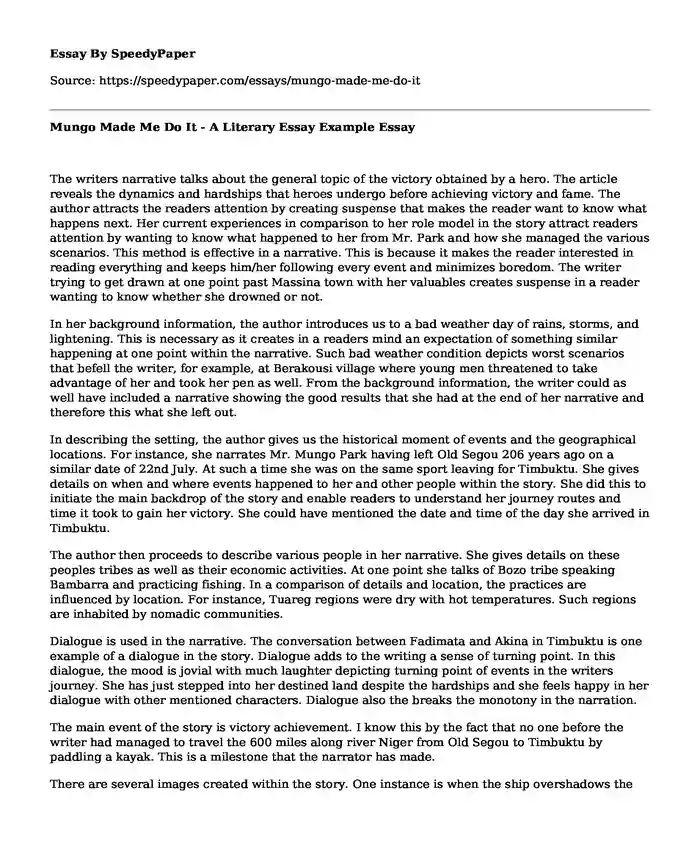
| Type of paper: | Essay |
| Categories: | Literature |
| Pages: | 3 |
| Wordcount: | 690 words |
The writers narrative talks about the general topic of the victory obtained by a hero. The article reveals the dynamics and hardships that heroes undergo before achieving victory and fame. The author attracts the readers attention by creating suspense that makes the reader want to know what happens next. Her current experiences in comparison to her role model in the story attract readers attention by wanting to know what happened to her from Mr. Park and how she managed the various scenarios. This method is effective in a narrative. This is because it makes the reader interested in reading everything and keeps him/her following every event and minimizes boredom. The writer trying to get drawn at one point past Massina town with her valuables creates suspense in a reader wanting to know whether she drowned or not.
In her background information, the author introduces us to a bad weather day of rains, storms, and lightening. This is necessary as it creates in a readers mind an expectation of something similar happening at one point within the narrative. Such bad weather condition depicts worst scenarios that befell the writer, for example, at Berakousi village where young men threatened to take advantage of her and took her pen as well. From the background information, the writer could as well have included a narrative showing the good results that she had at the end of her narrative and therefore this what she left out.
In describing the setting, the author gives us the historical moment of events and the geographical locations. For instance, she narrates Mr. Mungo Park having left Old Segou 206 years ago on a similar date of 22nd July. At such a time she was on the same sport leaving for Timbuktu. She gives details on when and where events happened to her and other people within the story. She did this to initiate the main backdrop of the story and enable readers to understand her journey routes and time it took to gain her victory. She could have mentioned the date and time of the day she arrived in Timbuktu.
The author then proceeds to describe various people in her narrative. She gives details on these peoples tribes as well as their economic activities. At one point she talks of Bozo tribe speaking Bambarra and practicing fishing. In a comparison of details and location, the practices are influenced by location. For instance, Tuareg regions were dry with hot temperatures. Such regions are inhabited by nomadic communities.
Dialogue is used in the narrative. The conversation between Fadimata and Akina in Timbuktu is one example of a dialogue in the story. Dialogue adds to the writing a sense of turning point. In this dialogue, the mood is jovial with much laughter depicting turning point of events in the writers journey. She has just stepped into her destined land despite the hardships and she feels happy in her dialogue with other mentioned characters. Dialogue also the breaks the monotony in the narration.
The main event of the story is victory achievement. I know this by the fact that no one before the writer had managed to travel the 600 miles along river Niger from Old Segou to Timbuktu by paddling a kayak. This is a milestone that the narrator has made.
There are several images created within the story. One instance is when the ship overshadows the writer like leviathan as passengers keep watching. Another image is created when a large object seems to suddenly come beneath Yatanis skin. In the reading process, images bring a sense of imagination to the readers mind and help perceive the scene of the event.
In conclusion, I have learned that success never comes on a silver plate. To become a pioneer, warrior or a hero, one must pass through thorns in preparation. Life is all about how hard we work to achieve our ambitions, desires or dreams. The author went against all odds to achieve her victory. She was mocked with some discouraging her because of her gender, but she broke the record by being the first female to venture 600 miles journey on a kayak.
Cite this page
Mungo Made Me Do It - A Literary Essay Example. (2019, Nov 20). Retrieved from https://speedypaper.com/essays/mungo-made-me-do-it
Request Removal
If you are the original author of this essay and no longer wish to have it published on the SpeedyPaper website, please click below to request its removal:
- Check Jamaica Nation Research in Our Free Essay
- Sport Essay Sample: Losing a Football Season
- Essay Sample on Cell Phones Usage in School
- Free Essay Example on the Global Obesity Scourge
- Dissertation Help for Impeccable Results, Free Paper
- The image of the Indians in the Late Nineteenth Century. Paper Example
- A Goodman is Hard to Find. Free Essay
Popular categories




